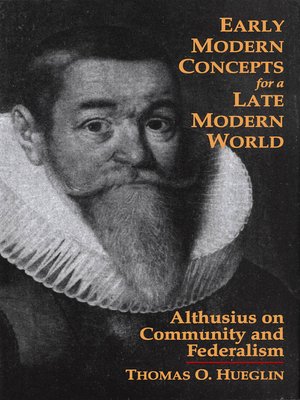Early Modern Concepts for a Late Modern World
ebook ∣ Althusius on Community and Federalism
By Thomas O. Hueglin

Sign up to save your library
With an OverDrive account, you can save your favorite libraries for at-a-glance information about availability. Find out more about OverDrive accounts.
Find this title in Libby, the library reading app by OverDrive.



Search for a digital library with this title
Title found at these libraries:
| Library Name | Distance |
|---|---|
| Loading... |
Who was Althusius, and why is the work of a seventeenth- century political theorist important in modern times?
Johannes Althusius (1557-1638) was a political theorist and a combative city politician who defended the rights of small communities against territorial absolutism. He designed a system of politics in which sovereignty would be shared and jointly exercised by a plurality of collectivities, spatial as well as social, on the basis of mutual consent and social solidarity.
Early Modern Concepts for a Late Modern World places Althusius in the context of his times and explains the main features of his political thought. It also suggests, perhaps most significantly, why his theories continue to resonate today. Hueglin's use of sources is thorough and scrupulous. He has worked in depth in Germanic scholarship and this access to German-language sources, some of which are almost unknown to the English-speaking world, provides a new interpretation of Althusius' theory.
With its emphasis on pluralized governance, negotiated compromise instead of majority rule, and the inclusion of the economic sphere into the political, Althusius' theory belongs to a countertradition in Western political thought. Although it was written at the beginning of the modern age of sovereign politics, it applies to today's search for a post-sovereign system of politics.







